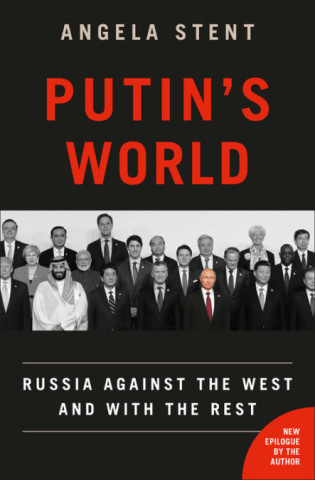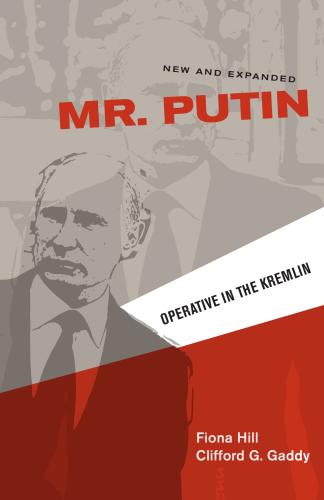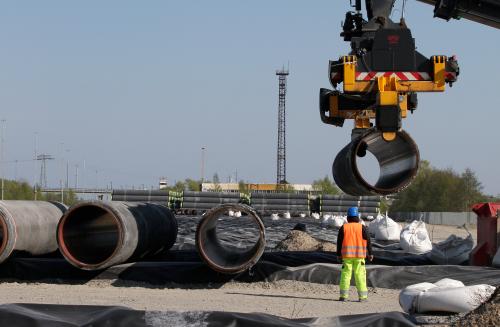Congress has long weighed sanctions as a tool to block the Nord Stream II gas pipeline under the Baltic Sea from Russia to Germany. Unfortunately, it has mulled the question too long, and time has run out. With some 85% of the pipeline already laid, new congressional sanctions aimed at companies participating in the pipeline’s construction will not stop it. Instead, they will become a new bone of contention between the United States and Europe.
There is a smarter way for Congress to proceed, one that could avoid a U.S.-Europe spat while ensuring significant gas flows continue to transit through pipelines in Ukraine.
The giant Russian Gazprom parastatal company currently moves a large amount of gas through Ukraine to destinations located further west in Europe. In 2018, the volume totaled 87 billion cubic meters (BCM), shipped under a contract that expires at the end of 2019.
The Ukrainians would like to negotiate a new long-term contract, ideally, for 10 years. Russian negotiators, however, have proposed an agreement that would last only one year, anticipating completion in 2020 of Nord Stream II and a separate pipeline to Turkey. The two new pipelines will have a combined capacity of about 71 BCM, meaning that they could take most of the gas that now traverses pipelines through Ukraine.
These new pipelines reflect a decision taken by Moscow more than a decade ago to find ways to get gas to Europe that circumvent Ukraine. The Russian government and Gazprom seek to eliminate Gazprom’s dependence on Ukrainian pipelines as well as to end the transit fees that last year generated $3 billion in revenue for Kyiv.
As Russia has reduced its dependence on Ukraine for transiting gas, Kyiv stopped importing gas directly from Russia for Ukrainian use in 2015, instead bringing gas in from Poland, Hungary, and Slovakia. That gas fills about one-third of Ukraine’s needs, with domestic production satisfying the remainder.
The European Union has sought to facilitate agreement between Kyiv and Moscow on a new contract on gas transit. A deal so far has eluded negotiators, given the wide difference in proposals for a new contract’s duration and Russia’s unreasonable demand that Ukraine drop a $2.7 billion judgment it won against Gazprom.
That all raises questions as to what happens on January 1, 2020. Some suspect that, if there is no agreed contract, Gazprom might nevertheless continue to ship gas west via Ukrainian pipelines, daring Kyiv to stop the flow and incur the wrath of those European countries that depend on that gas.
European Union officials have suggested a 10-year contract with a provision requiring that 60 BCM of gas be shipped each year via Ukraine. While making clear her support for Nord Stream II, German Chancellor Angela Merkel also expressed support for Ukraine continuing to transit significant volumes of Russian gas.
Nord Stream II has concerned Congress, which fears the pipeline would deepen Europe’s dependence on Russian gas and would allow Gazprom to reduce the gas it ships via Ukraine, perhaps to a trickle. Committees in both houses of Congress have developed legislation to sanction companies involved in constructing the pipeline, particularly those owning the ships that are laying the pipes. However, given that the pipeline is almost complete and Congress has not yet passed the legislation, those sanctions could end up punishing European companies — but not actually stopping the pipeline.
It will prove difficult for Congress to make Europe cut its dependence on Russian gas.
It will prove difficult for Congress to make Europe cut its dependence on Russian gas. In any case, Nord Stream II is less about how much gas Europe buys from Russia than about how Russia ships that gas to European markets.
On the latter question, Congress could help protect gas transit through Ukraine. It could amend the legislation, perhaps by adding provisions to provide for waiving the Nord Stream II-related sanctions if a long-term gas transit contract were agreed on between Kyiv and Moscow, a contract that entailed a significant flow of gas through Ukraine. That would give EU negotiators and Merkel an additional incentive to broker an agreement sustaining significant gas transit revenues for Kyiv.
Clearly, Congress’s preferred solution is to block Nord Stream II. That now seems all but impossible. Congress still has a chance to facilitate a second-best outcome, one that would ensure that Ukraine could continue to take advantage of — and profit from — its position as a transit country for Russian gas while avoiding creation of a new area of disagreement with Europe. Congress should amend its legislation accordingly.








Commentary
Congress, Nord Stream II, and Ukraine
November 12, 2019